Center for Teaching and Learning
Contact Us
Room: M-414
Phone: (718) 482-5462
AskCTL@lagcc.cuny.edu
Upcoming Events
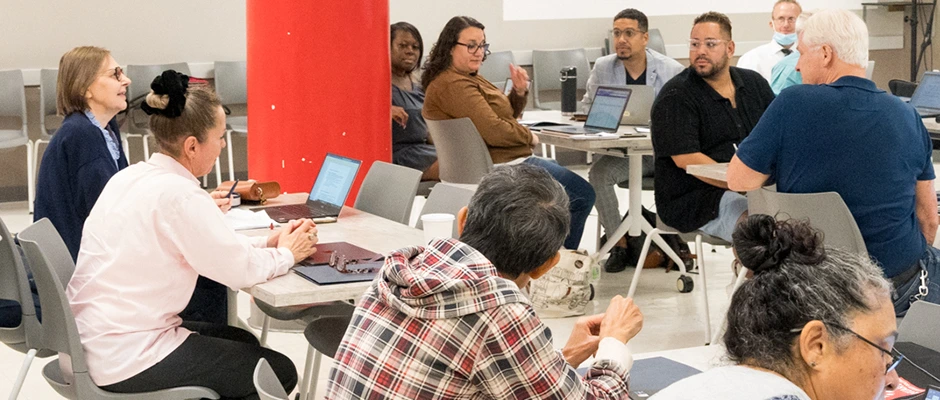
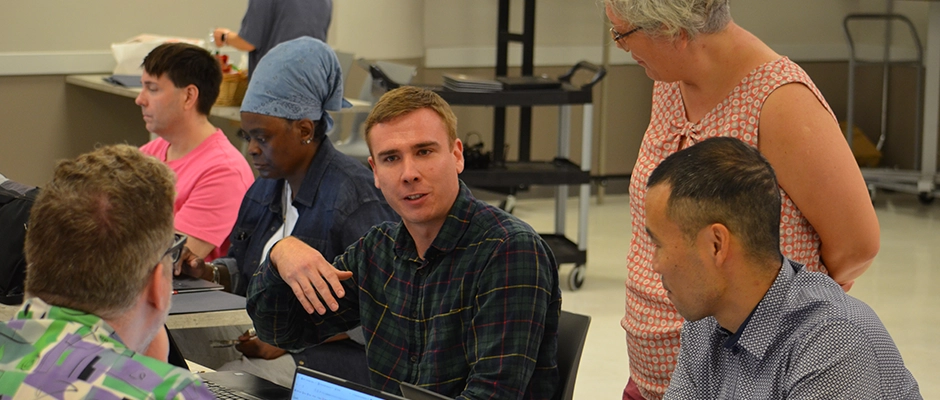
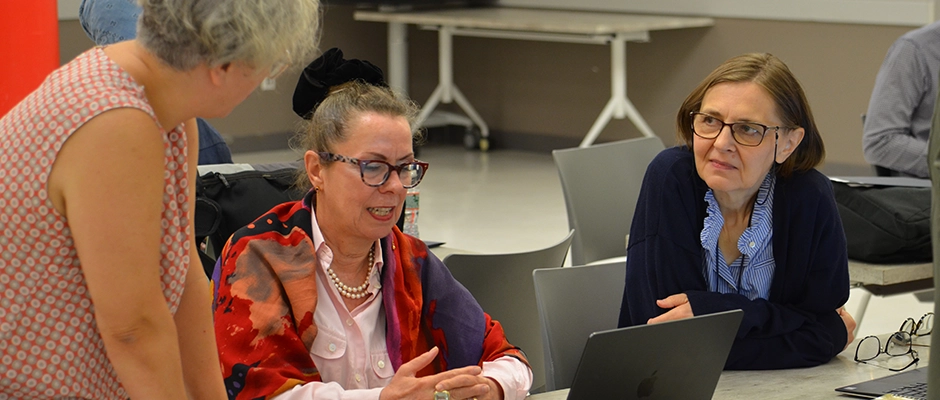
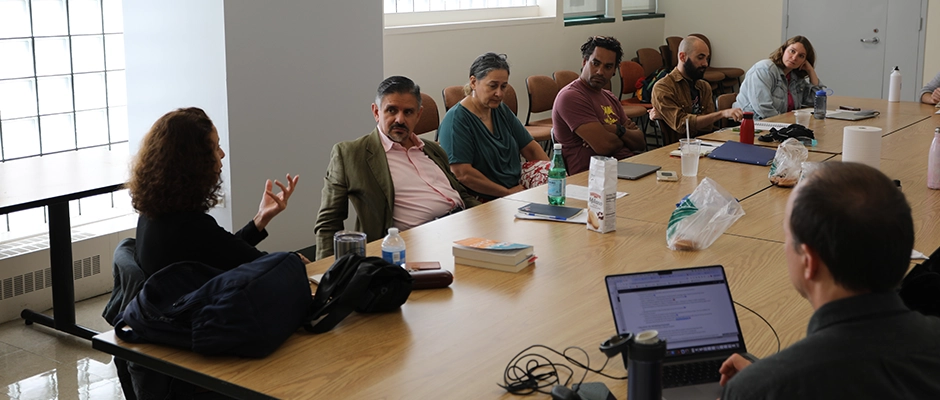
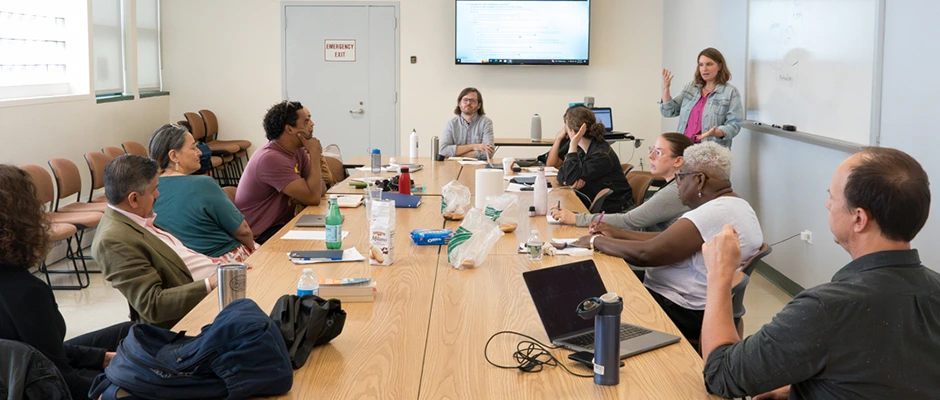
The application for 2025-26 CTL Professional Development Seminars is now open. Please review the seminars’ descriptions, including dates and commitments, consult with your department chairperson or supervisor and apply here by September 2.
The Center for Teaching and Learning (CTL) is a hub for professional innovation, collaboration, and transformation. Our mission at the CTL is to strengthen and promote a culture of collaboration, continuous learning and innovation for all members of the LaGuardia community while prioritizing equity and access for all students and contributing to our students’ intellectual growth and career development.
By engaging the collective expertise of LaGuardia faculty and colleagues across the nation, the CTL provides resources and opportunities that support reflective teaching practice, student-centered pedagogies and scholarly approaches to teaching
Learn more about the guiding principles by which the CTL operates its programming
In all of its programs, the Center seeks to manifest these key principles:
- Respect Faculty Knowledge. Effective professional development builds on faculty’s tremendous expertise. Faculty leaders are critical to success. So are formal and informal opportunities for faculty participants to share and learn from each other. Encourage multiple perspectives and approaches.
- Focus on the classroom. Classroom practice is the nexus of professional growth. Link questions of theory to practical possibilities for the LaGuardia classroom. Focus on activities, classroom resources, technologies and approaches that faculty can actually use with students. Model good classroom practice. Faculty should be able to walk away from each seminar with new skills and resources. Make it useful.
- Support Collective Inquiry. Meaningful professional development provides opportunities to explore important questions about learning and teaching through a gradually unfolding inquiry process. Faculty are master learners—help them apply the tools of scholarship to their own classroom practice. Innovative faculty see their classrooms as laboratories, sites for thoughtful pedagogical experimentation and documentation, with the seminar providing opportunities for reflection and exchange.
- Create Opportunities for Sustained Work. Change in professional practice happens over time. One-shot workshops are primarily outreach, not faculty development. Faculty need structures and support that enables them to engage in a long-term and recursive learning process.
- Break Boundaries. Bring faculty together in groups that don’t normally work together. Create opportunities for faculty to explore contrasting disciplinary perspectives, and to collaborate across departmental lines, focusing on the holistic student experience. Help faculty develop ways to combine skill-building and discipline-based learning. Link classroom issues to larger questions about learning, teaching, and our highest goals for the College.
- Create a Supportive Professional Community. Teaching is a challenging profession. Innovation involves risk-taking. Establish a climate of support and thoughtful reflection, generating safe spaces, where faulty can talk about and learn from what doesn’t work, as well as what does.
- Respect Faculty Time. Make sure that seminars and workshops are carefully planned and well organized. Think about the details. Make sure that hand-outs and activities are clear and accurate. Work hard to start on time and end on time. Provide good food.
Learn more about the CTL Advisory Council
Since 2022, the CTL Advisory Council—made up of faculty and staff throughout the college— has joined the CTL director and professional development staff in shaping the CTL’s priorities and programming. In 2023-24, the CTL AC members were:
- Anita Baksh, English
- Rachel Boccio, English
- Luke Cardaio, Student Affairs
- Milena Cuellar, MEC
- Jasmine Edwards, Community Health and Wellness
- Charlie Elias, Administration and Finance
- Arianne Fernandez, Humanities
- David Housel, ACE
- Dusana Podlucka, Social Science
- Kayla Williams, Student Affairs
- Vanessa Bing, Social Science
- Marta Kowalczyk, Natural Sciences
- Pau Fess, English
- Andre Ford, ACE
- Jesse Schwartz, English
- Manisha Dindial, Student member
- Emily Ramos, Student member
- David Brandt, AA/CTL
- Pablo Avila, AA/CTL
- Ljubica Depovic, AA/CTL
Goals for the 2025-2026 Academic Year
The CTL professional development activities in the upcoming year support three pillars of the LaGuardia 2025-29 Strategic Plan: Teaching and Learning, Career Success, and Diversity, Equity and Inclusion.
Learn more about the CTL’s goals for the 2025-2026 academic year
The seminar lineup for next year is directly aligned with the following goals or actions from the Strategic Plan:
- Increase faculty professional development in high-impact practices, including culturally responsive teaching, equity-minded practices, online teaching, course design, AI and learning outcomes assessment
- Increase use of academic data to identify barriers to student progression and direct resources accordingly, for example, to courses with high DFWI rates or limited availability
- Increase opportunity for experiential and global learning
- Promote career connected learning
- Embed career awareness, NACE Competencies, and job readiness skills in degree program curricula
- Reduce achievement gaps by race/ethnicity, gender, and student status (PT/FT)
- Ensure a welcoming, inclusive, and supportive community for all
- Encourage inclusive teaching practices
- Provide cultural competence training for faculty and staff
Events
The CTL hosts a wide range of events for faculty to convene and engage with one another. We host informal conversations, workshops, and other events to help you develop your skills as an instructor — access resources from past events and learn more about the different kinds of events we host below.
These are informal opportunities for faculty to connect with colleagues from across the College who are interested in similar themes or research to share and learn from each other. Please reach out to AskCTL@lagcc.cuny.edu if you are interested in facilitating a session or would like to suggest a topic.
These are forums for faculty to share their lessons, assignments, teaching projects with colleagues, receive feedback and inspire others. Past showcases include the GAI Institute Showcase at Opening Sessions: Empowering Future-Ready Graduates: Faculty Innovations in AI Integration. Keep an eye on our calendar for upcoming showcases you can attend.
The Student Technology Mentors (STM) team will offer two AI workshops for students in E232 on Friday, October 25 at 10:30-11:30 and on Monday, October 28 at 2:15-3:15. These sessions will cover free AI tools such as Microsoft Copilot or ChatGPT that students can use to support their learning across disciplines. Students can register and learn about other technology workshops offered by the STM team here.
- September 24, 2024: AI and Your Classroom: A Conversation with Faculty and Students, facilitated by Ximena Gallardo and David Brandt — Student Guide to AI
- October 1, 2024: Universal Design, facilitated by Derek Stadler — Universal Design Materials
- October 8, 2024: Data Analysis for Equity and Inclusion, facilitated by Reem Jaffar and Milena Cuellar — CTL Workshop Data Democratization
- October 15, 2024: HIP: ePortfolio, facilitated by J. Elizabeth Clark — HIP: Engaging ePortfolio Beyond Assessment
- October 22, 2024: COIL, facilitated by Olga Aksakalova, Marta Kowalczyk, and Anita Baksh — Collaborative Online International Learning Presentation
- November 19, 2024: CUNY Building Bridges of Knowledge Project on AI, facilitated by Milena Cuellar, Daniel Boudon, Maria Savva, and J. Elizabeth Clark Building Bridges of Knowledge (BBK)
- November 21, 2024: Online Learning, facilitated by Janet Michello and Michele de Goeas-Malone — Online Learning Resources
- November 22, 2024: Reading and AI Panel: Can AI Tools Help Students Read, facilitated by Ximena Gallardo, Sue Livingston, Iain Coggins — ChatGPT Newob Course Readings Discussion Partner
These are informal opportunities for faculty to connect with colleagues from across the College who are interested in similar themes or research to share and learn from each other. Please reach out to AskCTL@lagcc.cuny.edu if you are interested in facilitating a session or would like to suggest a topic.
These are forums for faculty to share their lessons, assignments, teaching projects with colleagues, receive feedback and inspire others. Past showcases include the GAI Institute Showcase at Opening Sessions: Empowering Future-Ready Graduates: Faculty Innovations in AI Integration. Keep an eye on our calendar for upcoming showcases you can attend.
The Student Technology Mentors (STM) team will offer two AI workshops for students in E232 on Friday, October 25 at 10:30-11:30 and on Monday, October 28 at 2:15-3:15. These sessions will cover free AI tools such as Microsoft Copilot or ChatGPT that students can use to support their learning across disciplines. Students can register and learn about other technology workshops offered by the STM team here.
Teaching in Digital Spaces
The CTL supports seminars, workshops, presentations, and initiatives that promote learning in digital environments.
LaGuardia is a national leader in ePortfolio practice, with thousands of students creating an ePortfolio in their first semester that they will develop over their academic experiences at LaGuardia. Faculty and staff use ePortfolio as a tool to facilitate students’ ongoing exploration of connections between academics and career preparation leveraging their academic and extracurricular experiences at LaGuardia to create emerging professional identities.
Our ePortfolio Consultants, a team of LaGuardia alumni and current CUNY students, offer their expertise through training in the development and design of ePortfolios, as well as support with the implementation of ePortfolio in the classroom. Services range from workshops to one-on-one student or faculty consultations. Learn more about ePortfolio here, or sign up for a session with one of our ePortfolio Consultants.
The CTL staff, in collaboration with a few members of the Senate Online Learning Committee, have created an asynchronous training for faculty interested in online teaching. Offered via Blackboard, this course covers pedagogy, strategies, and resources specific to this modality. For further information or assistance, please contact Pablo Avila at pavila@lagcc.cuny.edu. For more resources on online teaching you may also visit the LaGuardia Online page.
The CTL provides resources and instructional support to faculty building their hybrid and online courses. This includes the use of different web resources to engage students with content and to foster collaboration among students in online environments. For more information, please contact Pablo Avila at pavila@lagcc.cuny.edu or the Student Technology Mentor program at stm@lagcc.cuny.edu.
LaGuardia Effective Online Teaching Training for Faculty
This self-paced course is for instructors who are new to teaching online or want to improve their student engagement in online and hybrid courses. It focuses on online pedagogy, rather than basic technical skills. For those teaching hybrid courses, the sections on student engagement can help with organization of materials. The modules are:
- Module 1: Getting Started
- Module 2: Introduction to Online Teaching
- Module 3: Course Design and Content
- Module 4: Communication and Interaction
- Module 5: Assessment and Feedback
- Module 6: Exploring Active Learning
- Module 7: Inclusivity and Diversity in Online Teaching
To access the course, faculty can login to Brightspace and find the “LaGuardia Effective Online Teaching Training for Faculty” course under the “Discover” tab. The course is available starting on March 31 and faculty will be able to self-enroll. If you need help accessing the course, reach out to Pablo Avila at pavila@lagcc.cuny.edu.
Student Technology Mentors (STM) provide workshops to introduce faculty to or answer more advanced questions about the technical aspects of Blackboard, Digication and, in fall 2025, Brightspace. Check back for dates.
Scholarship of Teaching and Learning
Reflective teaching practice is at the core of the CTL sponsored activities. From CTL conversations or workshops to seminars, through college wide resources, faculty wishing to apply a scholarly research lens to their own teaching practice can find support and guidance in that process from idea generation to publication.
If you want to get involved, look for communication from the CTL to apply for the SoTL or TIP seminars when they are announced, or email askctl@laguardiacc.cuny.edu about your interest to join the FSPW, described below.
In the year-long Carnegie Seminar on the Scholarship of Teaching and Learning (SoTL), faculty investigate significant issues in the teaching and learning in their fields and complete a scholarly paper for internal publication in In Transit: LaGuardia’s Journal on Teaching and Learning.
Since 2005, In Transit: LaGuardia’s Journal on Teaching and Learning has invited LaGuardia faculty to submit scholarly inquiries into faculty teaching, defined by Pat Hutchings as “the conditions under which [learning] occurs, what it looks like, how to deepen it with an eye not only to improving their own classrooms, but to advancing practice beyond it.” Proposals span a variety of methodical approaches, including case studies, empirical research, literature reviews, and reflective essays, address the college’s mission and problem-solving and global initiatives, and define disciplinary-based learning objectives.
In Transit publications demonstrate credible knowledge of the background and purposes of the SoTL, as well as faculty awareness of the practical implications of their disciplinary research for the diverse communities and identities of LaGuardia students, faculty, and staff.
Primarily for new faculty but open to all to study an assignment or a teaching practice, implement it, collect data and turn it into SoTL research. Follow-up support toward publication is provided by faculty mentors and through existing college-wide resources.
Effective teaching requires consistent evaluation of student learning. In the Teaching as Inquiry Practice (TIP) seminar, participants expand their pedagogical “toolbox” by exploring various strategies used to assess learning. Through a series of hands-on activities and workshops, participants will become more thoughtful in their approach to assessment planning and implementation
- Learning Matters Assignment Library (submissions to LMAL is part of CTL seminars) LaGuardia’s Learning Matters Assignment Library (LMAL) is a faculty-generated online resource housed within CUNY Academic Works. Read more about it here.
- Faculty Scholars Publication Workshop (FSPW), which supports faculty’s disciplinary-focused research, provides faculty with support structures for at least a full academic year or more. It is offered by the CTL based on faculty interest, and will be listed under CTL seminars.
- Literacy Brokers Writing Circle, an 8-week session open to anyone working on a piece of writing. Learn more here.
- Library’s Scholarly Publishing Teahouse
- Library workshops on topics like predatory publishing, hands-on practice with new databases, and techniques for researching potential publishers.
Teaching and Resources Hub
Below, we’ve compiled a series of resources to help you enrich your courses and improve your students’ experience.
List of recommended resources: https://citl.indiana.edu/teaching-resources/course-design/backward-course-design/index.html
Over the years, the CTL has compiled examples of our faculty’s work with students across a range of activities. For example, the ePortfolio sampler features work by LaGuardia faculty and provides useful, engaging activities that others may use or adapt. View samples here.
Since January of 2023, the CTL has hosted workshops, seminars, institutes and roundtable discussions on AI in education. The Generative AI Literacy Resource Site serves as a hub to showcase the work of faculty and staff who participated in these activities and are exploring how these new tools could be used to advance students’ learning and encourage critical thinking, while being mindful of their ethical use.
Here you can read about AI projects developed by your colleagues, connect with faculty and staff for collaboration or to learn about their experiences, and find resources shared and recommended by LaGuardia faculty and staff. If you want to contribute sample practice, such as your assignment, syllabus, project to share at this resource page, please contact Kyoung Kang.
The CTL and the Global and Experiential Learning Office offer two seminars jointly: Community Based Learning – An Experiential Learning Approach, and Experiential Learning in the fall and Pedagogy, Community Outreach, Career Readiness in the spring. Learn more.
If you have a question about teaching, or would like to lead a conversation circle or workshop for a larger college audience, contact AskCTL@lagcc.cuny.edu.
New Faculty Resources
The CTL provides several resources to new faculty at LaGuardia, including the New Faculty Colloquium, a year-long program that helps ease new faculty into our campus.
In this year-long orientation to teaching and learning at LaGuardia, new full-time faculty work with CTL staff, senior colleagues, and chairpersons to learn about their new professional environment. Participants learn from each other and colleagues across the College about LaGuardia’s students, college-wide initiatives, networking opportunities, institutional resources to support scholarship and service, and pedagogical strategies proven to be effective at LaGuardia.
The Colloquium provides a setting where new faculty can form friendships that carry into future endeavors. Colloquium activities include introductions to key processes, resources, and information that will help new faculty successfully navigate their first year at the college and set the stage for a successful LaGuardia career.
- LaGuardia Faculty and Staff Portal: Access key resources such as Blackboard CUNYfirst, Outlook, the IT HelpDesk, and more
- A Handbook for New Faculty: A guide with everything you need to know about teaching here at LaGuardia.
Assessment and Core Competencies
The CTL supports the College’s Outcomes Assessment process by providing year-long and mini-seminars that support the development of course activities and assignments linked to the College’s general education Core Learning Competencies and Communication Abilities. Our faculty have determined that these competencies (Global and Integrative Learning, Inquiry & Problem Solving) and abilities (Oral, Written, and Digital Communication) are key for students’ development as modern learners—for college and career.
Every academic program includes a range of courses across the curriculum that incorporate assignments that help students build the Core Competencies and Abilities. Faculty teaching these courses will implement assignments aligned with rubrics for each Competency or Ability; students enrolled in these courses will deposit their work for future scoring as part of a programmatic or college-wide Benchmark Reading. To support assignment development, the CTL announces a range of seminar and mini-grant offerings each spring for faculty interested in participating the following year.
To learn more about these offerings and how they connect with the Learning Competencies and Communication Abilities, or to browse relevant assignments, please visit the CTL Seminars page and the LaGuardia Assessment page.
Check the competencies in your course in Digication, a platform housing ePortfolio.
CTL Initiatives and Mentor Programs
External Partnerships
We value the social dimensions of learning. Collaboration is an important aspect of our work in the CTL, and this extends from our college-based programs to work with colleagues local to CUNY, and on a regional or national scale. Here are some examples of our partnerships with external groups and organizations:
The CUNY Innovative Teaching Academy offers a wealth of professional development opportunities for faculty across CUNY. These sessions are not only another useful resource for faculty but also an opportunity for a cross campus networking and exchange of ideas.
LaGuardia’s Center for Teaching and Learning is an active member of the CUNY-wide CTL Council, a network for support among CUNY campus’ pedagogical centers. The CTL Council’s website describes its mission as working cooperatively within CUNY to prioritize teaching and learning considerations in University planning and decision-making.
TA partnership between the CUNY Graduate Center and LaGuardia Community College, with support from the Andrew W. Mellon Foundation, the CUNY Humanities Alliance trains Ph.D. students in the most successful methods for teaching humanities courses in some of the country’s most diverse undergraduate classrooms. Working with graduate students, administrators in the Graduate Center, and LaGuardia faculty, the CTL supports professional development that helps to broaden and strengthen access to and engagement in the humanities for LaGuardia students.